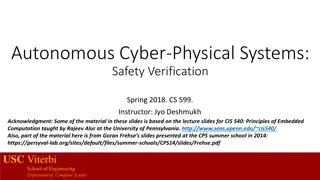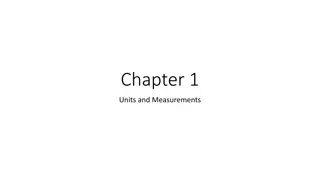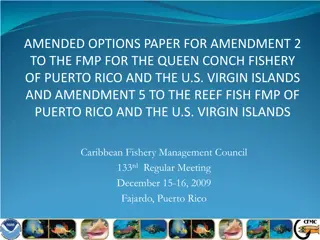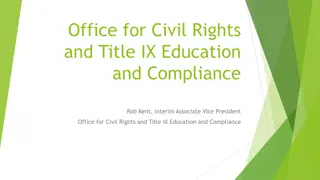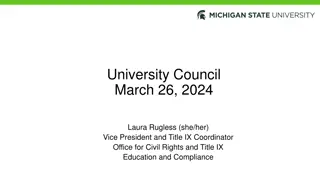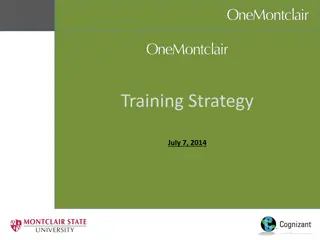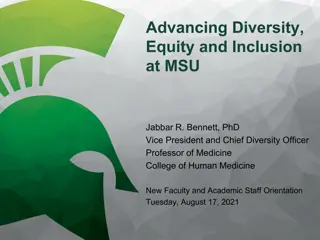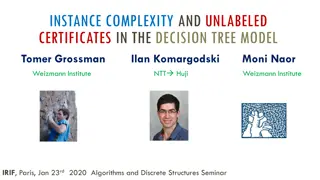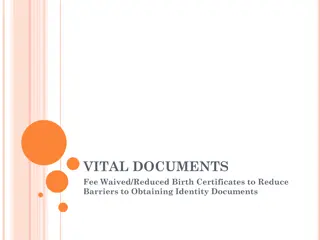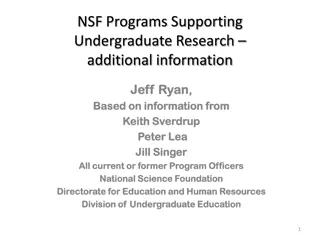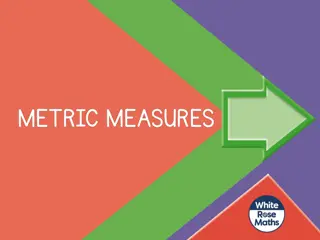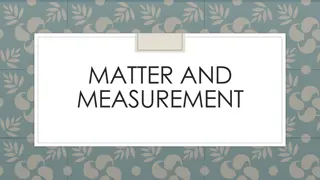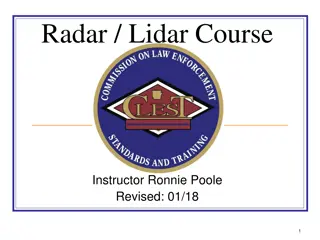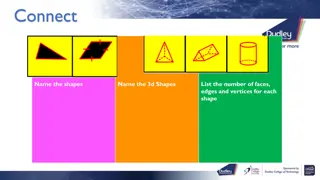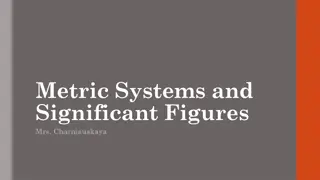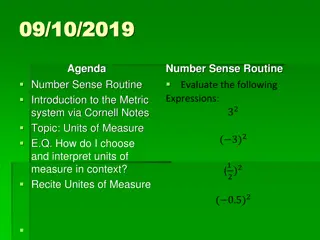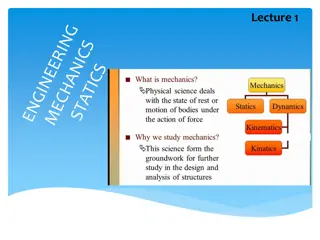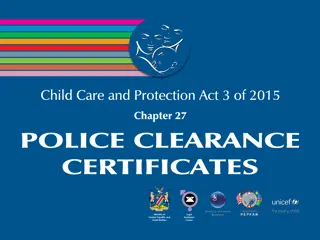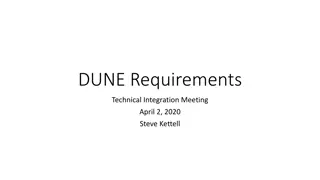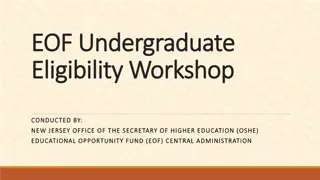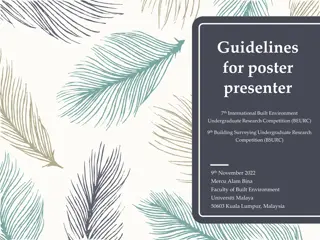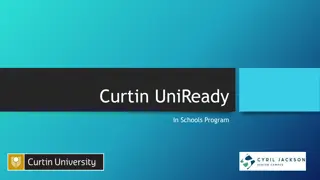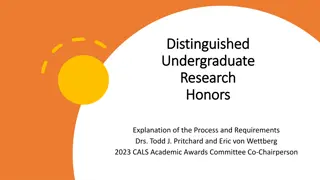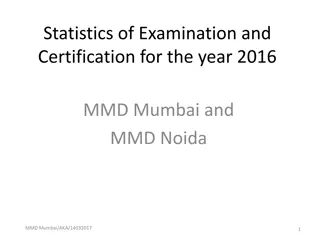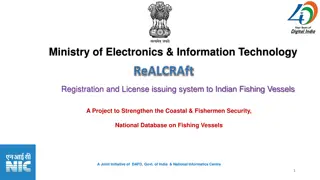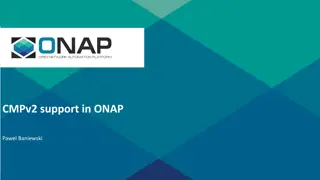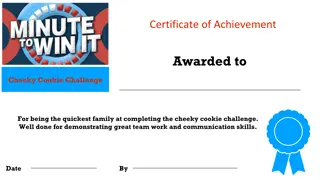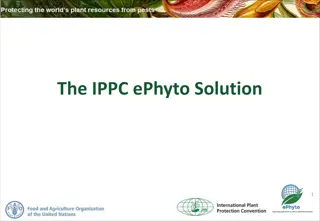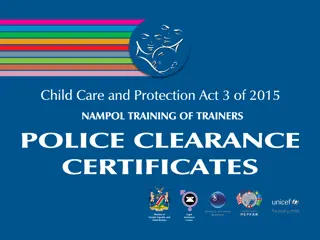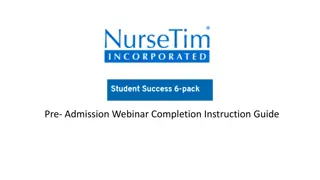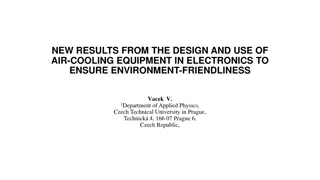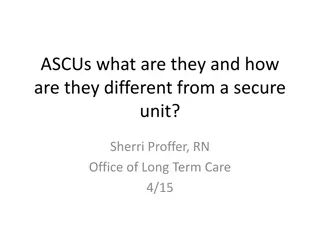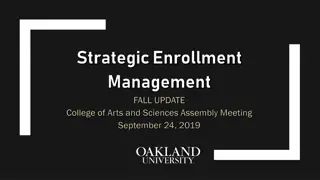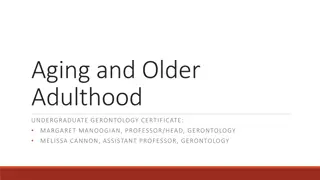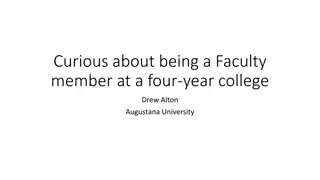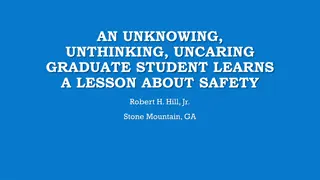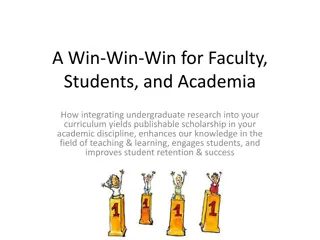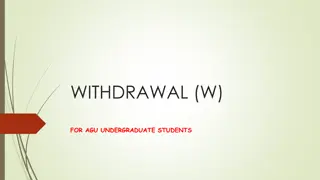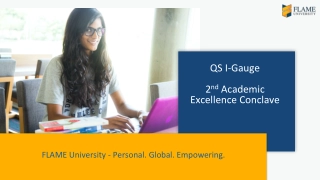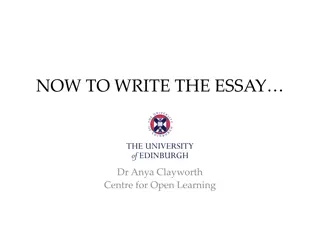Undergraduate Certificates: Guidance and Requirements for MSU Units
Undergraduate certificates (UGCs) at MSU provide a focused, structured set of experiences distinct from majors and minors, enhancing expertise in specific areas. The initiative aims to attract dynamic undergraduate students, increase diversity, eliminate opportunity gaps, recruit talented learners, and address current issues. Contrasted with minors, UGCs have specific requirements such as credit hours, learning outcomes, admission criteria, and sponsoring academic units.
Uploaded on Sep 12, 2024 | 0 Views
Download Presentation

Please find below an Image/Link to download the presentation.
The content on the website is provided AS IS for your information and personal use only. It may not be sold, licensed, or shared on other websites without obtaining consent from the author. Download presentation by click this link. If you encounter any issues during the download, it is possible that the publisher has removed the file from their server.
E N D
Presentation Transcript
Undergraduate Certificates Guidance for MSU units Created Fall 2022 Prepared by James Lucas,
Undergraduate Certificates An undergraduate certificate (UGC) is a set of programmatic or thematically linked curricular and co-curricular activities that serves as a micro-credential distinct from majors and minors. The certificate provides a focused, structured, and interrelated set of experiences that enhances the participant s expertise in an area of specific disciplinary, interdisciplinary, or thematic topics or that addresses a defined professional development need. UGCs might broaden participants ability to work across disciplines, deepen their ability to work within a discipline, and/or make their individualized academic work more distinctive and demonstrable on their academic record.
Goals for UGC programs UGC offerings should advance MSU s mission and support its strategic planning efforts. Specifically, the UGC initiative seeks to: 1. Strengthen MSU s ability to attract and meet the needs, goals, and aspirations of dynamic undergraduate students 2. Increase the number and diversity of learners MSU serves by providing wider access through targeted programs and proactive engagement with underserved communities 3. Strengthen students educational experience to eliminate opportunity gaps and support success through graduation and beyond 4. Develop and implement new strategies to recruit and retain highly talented and more diverse students across all disciplines 5. Ensure students and stakeholders have access to MSU and its resources to address current and emerging issues that affect Michigan and the world through micro-credentials and certificates
Minors vs. UGCs Minors UGCs a. Sub-set of a major or collection of interrelated courses related to a theme Minimum of 15 credits Serve MSU students Transcriptable Done as part of a degree program Does not necessarily include non-course components a. Disciplinary, interdisciplinary, thematic, or professional Minimum of 9 credits or their equivalent Serve MSU students & external stakeholders May be transcriptable or not May be completed separately from degree Can include co-curricular and experiential opportunities b. c. d. e. f. b. c. d. e. f.
Basic UGC Requirements 9 to 12 credit-hours or the equivalent in contact time (i.e., 126 168 hours of engagement) Stated learning outcomes and assessment process for all aspects of the program curricular and co-curricular Stated admission criteria and application process Transparent policies on acceptance of transfer or credits taken before admission, as well as standards for double-counting and unique credits Sponsoring academic unit (e.g., APUE, College, Department, or School)
Types of UGCs Type 1 inclusive of MSU courses and directly related to a major or minor program; open to MSU undergraduates; offered by a college, department, or school; and is transcriptable. Type 2 inclusive of MSU courses and distinct from a specific major or minor; open to MSU and guest students; offered by APUE or a college, department, or school; and is transcriptable. Type 3 may or may not include MSU courses; designed for guest students and external stakeholders; offered by APUE in collaboration with content-expertise units or a college, department, or school; and is not transcriptable as certificate. If inclusive of MSU courses, then participant must be enrolled as lifelong education, and the coursework would appear on an MSU transcript. Type 4 inclusive of MSU courses with university-wide focus; open to MSU and guest students; administered by APUE in collaboration with content-expertise units; and is transcriptable. Type 5 offered by the Institute of Agricultural Technology.
Explanation of UGC Types 1 - 4
UGC Type 1 Target Audience MSU students in specific majors or minors Focus Disciplinary and/or interdisciplinary study related to specific majors or fields of study Credits 9 to 12 credits, or fewer credits with co-curricular/experiential learning Administering Unit Degree-granting college, department, or school Approval Process Unit curriculum committee, college curriculum committee, UCC, and UCUE Transcriptable Yes Admission Defined and administered by responsible academic unit Program fee Allowable to cover co-curricular and experiential components; funding goes to sponsoring unit(s)
Type 1: Characteristics & Examples Type 1 Certificates are highly-focused, specialized micro-credentials in an area of study related to a major or minor; they serve MSU students Type 1 Certificates would typically be offered by academic Departments or Schools for students in specific majors Admission requirements could be predicated on a certain academic background or knowledge Examples: Drone Technology, Departments of Geography and Civil Engineering Companion Animal Care and Grooming, Department of Animal Science Herbs and Supplements, Departments of Horticulture and Human Nutrition Social Media Law and Administration, Department of Advertising and Public Relations
UGC Type 2 Target Audience MSU or guest students with specified background Focus Inter-disciplinary, competency, and professional skills Credits 9 to 12 credits, or fewer credits with co-curricular/experiential learning Administering Unit Degree-granting College, Department, or School; APUE to serve as primary academic Unit for non-degree granting colleges and departments Approval Process Unit/college/APUE Curriculum Committee, UCC, and UCUE Transcriptable Yes Admission Defined and administered by lead academic unit Program fee Allowable to cover co-curricular and experiential components; funding goes to lead academic unit and may be split with collaborators
Type 2: Characteristics & Examples Type 2 Certificates are broader in focus than Type 1, and they serve a larger audience with less focus on a specific discipline; they serve MSU and guest students Type 2 Certificates would typically be offered by a degree-granting College or unit in collaboration with APUE and serve student across multiple majors and/or colleges Examples: Corporate Leadership & Decision-Making, Colleges of Business and Social Science Thinking in Systems, Colleges of Engineering and Agriculture and Natural Resources Art as Social Justice Protest, College of Arts and Letters, Music, and RCAH
UGC Type 3 Target Audience Guest students Focus Specialized disciplinary, interdisciplinary, or professional study Credits Experiential learning opportunities at least 9 SCH of contact time Administering Unit Degree granting College, Department, or School Approval Process Unit curriculum committee, College curriculum committee, APUE, and UCUE; if offered by non-Academic unit, starts with APUE Transcriptable No Admission Defined and administered by responsible academic unit Program fee Allowable to cover co-curricular and experiential components; funding goes to sponsoring unit(s)
Type 3: Characteristics & Examples Type 3 Certificates are co-curricular in design, do not require courses, and serve external stakeholders Type 3 Certificates might have parallel Type 2 and Type 4 offerings for MSU students, but these Type 3 UGC are designed to serve audiences without enrollment in MSU classes Examples: Diversity, Equity, and Inclusion for Educators, College of Education Culturally Competent Health Care, APUE with medical colleges Coding for Mid-Career Professionals, College of Engineering
Type 3: Special Notes These credentials need to mimic certain administrative processes, such as the creation of student group codes, as would occur during the curriculum process They need to embed assessment of student learning and outcomes If coursework is required for credit, then the credits will appear on a lifelong education transcript; however, the certificate itself is not transcriptable
UGC Type 4 Target Audience MSU and guest students Focus Inter-disciplinary, competency, and professionally based skills Credits 9 to 12 credits, or fewer credits with co-curricular/experiential learning Administering Unit APUE in collaboration (often with non-degree granting units) Approval Process APUE curriculum committee, UCC, and UCUE Transcriptable Yes Admission Defined and administered by APUE Program fee Allowable to cover co-curricular and experiential components; funding goes to APUE and can be shared with collaborators
Type 4: Characteristics & Examples Type 4 Certificates are similar like Type 2 certificates, but they either do not directly relate to content associated with a degree-granting College or provide content that crosses multiple Colleges They serve a pan-institutional and guest audience , often with focus on professional skills Type 4 Certificates are offered by APUE in collaboration with relevant campus units Examples: Career Readiness and Professionalism, APUE and Career Services First-Year Leadership, APUE and REHS Globally-Engaged Leadership, APUE and ISP
Simplified Summary Type 1 Type 2 Type 3 Type 4 Audience Focus MSU Students MSU or Guests Guests MSU or Guests Narrow; disciplinary or interdisciplinary Focused on specific majors or academic programs Medium; inter- disciplinary or professional skills Open to a specific College or Colleges Professional, skill-based May be focused on a specific stake-holder or professional group Broad; interdisciplinary or professional skills Open to most students and guests regardless of major Format Primarily coursework, with some experiential Mix of coursework and experiential No coursework, all experiential Mix of coursework and experiential Administration Academic colleges, departments, or schools Colleges APUE in partnership Academic departments, schools, or colleges APUE in partnership APUE in partnership Approval 1. 2. 3. Academic Department College UCC and UCUE 1. 2. College or APUE UCC and UCUE 1. 2. 3. Academic Department College or APUE APUE and UCUE 1. 2. APUE UCC and UCUE
Questions or Need Support For support with learning outcomes, certificate development, or partnerships with APUE, please contact the Assistant Dean for Global Education and Curriculum Jim Lucas, lucasjam@msu.edu For support related to submitted transcriptable certificates through the MSU curriculum process, UCC, and related academic policies, please contact the University Curriculum Administrator Joy Speas, jlspeas@msu.edu


